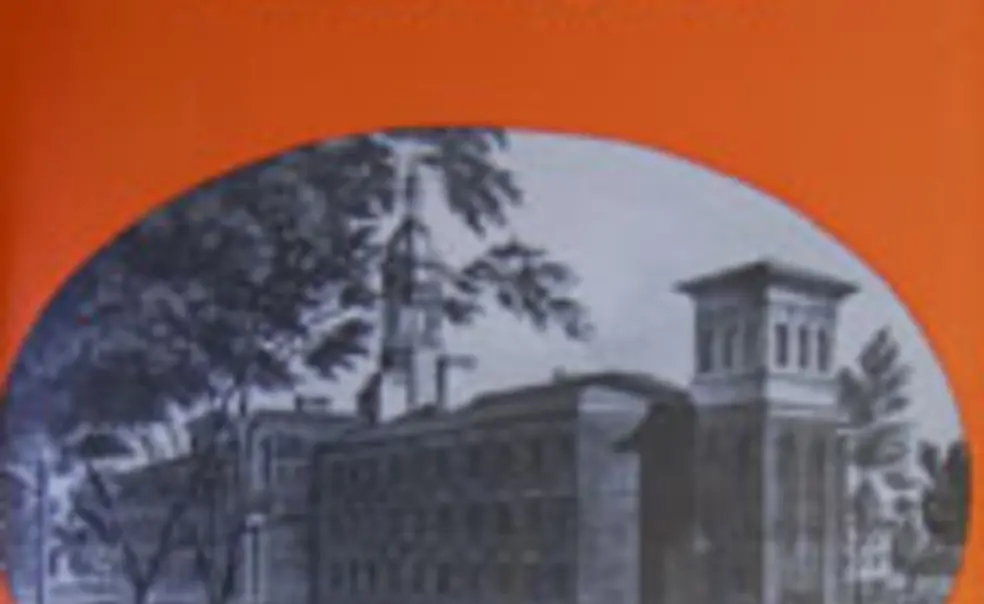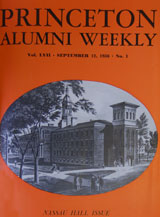From the Archives: Nassau Hall in the nation's service
June and July are among the slowest months of the year on Princeton’s campus, with no classes in session and only a scattering of students in the libraries and labs. But in the summer of 1783, the University – then the College of New Jersey – was filled with activity. Anti-government protests by Continental Army veterans in Philadelphia forced Congress to leave the city and reconvene at Princeton’s Nassau Hall, beginning on June 30. In the excerpt below, taken from a 1956 issue of Princeton Alumni Weekly that celebrated the 200th anniversary of Nassau Hall, history professor Thomas J. Wertenbaker explained the building’s brief role as the nation’s capitol.
From the “Nassau Hall Issue” of Princeton Alumni Weekly
Sept. 12, 1956
Historic Events
By Thomas J. Wertenbaker
… As Nassau Hall had been the first capitol of the state of New Jersey, in the summer of 1783 it became the capitol of the United States. As the Revolutionary War drew to a close rumors spread among the Continental troops that they were to be dismissed without receiving their back pay. Congress had been making desperate efforts to raise the money, but it was handicapped by the fact that it was not empowered to levy taxes. Late in June 1783, things took a serious turn, when a body of troops stationed in Philadelphia sent a threatening letter to Congress.
When Congress failed to meet their demands, they marched on the State House, two or three hundred strong, and stationed themselves around the buildings. Some of them went so far as to point their guns at the windows, and several actually laid hands on President Elias Boudinot. Congress was alarmed and deeply incensed at the insult to the authority of the United States. After it had made urgent appeals to the Pennsylvania Council for protection, and that body refused to call out the militia, it decided to move to Princeton.
So, one after another, the members packed up their belongings, and turned their backs on the City of Brotherly Love. New Jersey welcomed them. Governor Livingston wrote Boudinot promising to protect Congress, and declared that he would consider it an honor to be “personally engaged in defending the representatives of the United States against every insult and indignity.”
Samuel Stanhope Smith offered the use of Nassau Hall. If the prayer hall or the library could be of any service to Congress as places to hold sessions, he trusted they would use them during their stay in Princeton. A group of twenty-eight citizens declared themselves highly honored by the confidence of Congress in the choice of their town as the place of residence. Colonel George Morgan offered the use of “Prospect.”
Congress soon moved into Nassau Hall, probably because the library room, where it sat, was larger than any room at “Prospect,” and because it could use unoccupied students’ rooms for the meetings of its committees. Moreover, on special occasions to which the public was invited, it would be convenient to descend one flight of stairs to the prayer hall.
With Congress in the College, the celebration of the Fourth of July took on an especial significance. Ashbel Green and Gilbert T. Snowden were the orators. The former, who represented the Whig Society, spoke on “The Superiority of a Republican Government over Any Other Form.” It was an exciting moment for the youthful orators as they looked out over their distinguished audience. That evening President Boudinot gave a dinner at “Morven” to the members of “Congress, foreign ministers, … the faculty of the college, and some gentlemen of the town to the amount of 70 or 80.” After dinner Boudinot proposed thirteen toasts, each of which was followed by a discharge of artillery. Later in the evening, skyrockets and other fireworks were set off on the front campus.
Late in July Congress passed a resolution to request General Washington to come to Princeton. The general mounted his roan gelding, with an old crooked saddle and a flowered buff and blue saddle-cloth, and rode to Princeton. Arriving at Nassau Hall, he entered the room where Congress was sitting and was conducted by two members to a chair on the right of the president. The general faced a body of twenty-four men uncovered, the delegates of each state sitting together. He remained seated, as President Boudinot, without removing his hat, delivered the congratulatory address.
Congress felt it an especial pleasure to see him and to congratulate him on the success of a war in which he had acted so conspicuous a part, he said. His services had been essential in the winning of freedom and independence, and deserved the grateful acknowledgements of the nation. These acknowledgements Congress now took satisfaction in expressing. Though hostilities had come to an end, the country still needed his services. She wished to avail herself of his talents in forming arrangements necessary in time of peace.
To this Washington replied that the honorable reception which he was receiving gave him the deepest feelings of gratitude. He thought that Congress had been too generous in its estimate of his services to the United States. They should also consider how important had been the wisdom and unanimity of the national councils, the firmness of the citizens, and the pace and bravery of the troops. It was this combination which was responsible for the happy termination of war.
Washington must have been deeply moved. To receive the thanks of the representatives of the nation was just compensation for his years of hardship, danger, and discouragement. His mind must have reverted to the dark hours at Brooklyn, at Fort Lee, at Valley Forge; and then to the days of hope and triumph. As he looked around him, he could but recall that the very building in which he sat had played an important part in the turn of the tide of his military career. But his cannon no longer thundered against its walls; now the war was over, peace with independence had been won, and Congress was honoring him as the chief instrument in victory.
During the next few weeks Washington was a frequent visitor to Nassau Hall, where he came to confer with the committee on a peace establishment. “The object was to provide a system for foreign affairs, Indian affairs, for military and naval peace establishments, etc.” But though the work was “quickened by the presence of the commander in chief,” little progress was made. On September 20 John Francis Mercer wrote: “We are pursuing the peace arrangements, but under many discouragements, which damp our ardor.” Before anything of value had been accomplished, Congress left Princeton.
Perhaps the patriotic sentiments expressed by the students were, in part at least, responsible for Washington’s gift of fifty guineas, presented “as a testimony of respect to the college.” Deeply moved, the Trustees requested him “to sit for his picture to be taken by Mr. Charles Willson Peale,” so that it might hang in the hall in place of the picture of “his late Majesty.” This portrait shows Washington with lifted sword, the wounded Mercer on the ground behind him, and Nassau Hall in the distance. It “now occupies the place, and it is affirmed the very frame which contained the picture of George the Second, which was decapitated by Washington’s artillery,” wrote Ashbel Green in 1841. It has escaped two fires, and today hangs on one side of the president’s chair in the faculty room, while another portrait of George II, the gift of several alumni, hangs on the other.
On November 1 came the official end of the session of Congress, and two days later the delegates of the new Congress took their seats. But their stay in Nassau Hall was brief. They elected Thomas Mifflin to succeed Boudinot as president, and the next afternoon adjourned. So the members packed up their belongings, bade goodbye to their hosts, and set off for Annapolis, where they were to continue their meetings. Nassau Hall ceased to be the capitol of the United States.














No responses yet